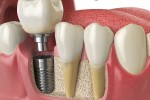Introduction
Dental implants offer a lasting solution for missing teeth. Unlike dentures, they fuse with your jawbone. They restore chewing function and preserve facial structure. But not all implants are the same. Different types of dental implants exist to meet various needs. From single-tooth replacements to full-arch solutions, your dentist will choose what’s right for you.
Types of Dental Implants: Endosteal Implants - The Most Common Option
Endosteal implants are the most widely used type of dental implants. They are typically shaped like small screws. These are inserted directly into the jawbone during surgery. They act as artificial roots to support crowns or bridges. Endosteal implants are ideal for patients with strong, healthy jawbones. The healing process involves osseointegration, where bone grows around the implant. This ensures a secure fit. These implants are often used when replacing one or more teeth.
Types of Dental Implants: Zygomatic Implants - For Severe Bone Loss Cases
Zygomatic implants are used when patients have extreme bone loss in the upper jaw. Instead of being anchored into the jawbone, they are fixed into the cheekbone (zygoma). This bone is dense and provides solid support. Zygomatic implants are more complex and require specialist expertise. They are often used when other implants are not viable. For many, this offers a life-changing solution without the need for extensive grafting.
Types of Dental Implants: Mini Dental Implants - Small But Effective
Mini dental implants are smaller than traditional implants. They are often used in cases where space or bone is limited. These implants are less invasive and typically require only a single procedure. The recovery time is shorter, and they’re often used to stabilise dentures. Mini implants are not suitable for every case, they’re a valuable option for selected patients. Particularly, older individuals or those with health conditions benefit from this approach.

Types of Dental Implants: All-on-4 Dental Implants
The All-on-4 technique uses four strategically placed implants to support a full arch of teeth. This method is popular for those needing complete restoration of upper or lower teeth. The implants are angled for maximum support. This often avoids the need for bone grafting. Patients can leave the clinic with a full set of functional teeth on the same day. It’s a cost-effective and time-efficient solution. Additionally, it offers excellent long-term stability and aesthetic results.
Types of Dental Implants: All-on-6 Dental Implants
Similar to All-on-4, the All-on-6 technique uses six implants instead of four. The additional implants provide more support and even load distribution. This method is ideal for patients with higher bite force or slightly lower bone density. It offers excellent durability and is often preferred for upper jaw restorations. Though the procedure is longer, the added implants enhance function and longevity. For those who want extra reassurance, All-on-6 can be worth considering.
Implant-Supported Bridges and Dentures
Implant-supported bridges are used when several teeth in a row are missing. Instead of placing an implant for each tooth, a few implants support the entire bridge. This reduces the number of implants needed while restoring multiple teeth. Implant-supported dentures are similar but cover an entire arch. These dentures lock into implants for better stability. Both solutions improve comfort and chewing ability compared to traditional dentures. They are ideal for patients wanting secure, long-lasting options.
Choosing the Right Type of Dental Implants for You
Your dentist will help determine the best type of dental implants for your needs. Factors include bone density, overall health, and how many teeth are missing. A full examination and sometimes imaging will guide the treatment plan. In many cases, lifestyle preferences and long-term goals also influence the decision. Whether you need a single implant or full-mouth restoration, there’s likely a suitable solution. Choosing the right one ensures comfort, function, and aesthetics.
Cost and Longevity Considerations with Different Types of Dental Implants
The cost of dental implants varies by type, material, and clinic location. Endosteal implants are generally the most affordable. Zygomatic and All-on-6 implants may cost more due to complexity. However, all dental implants offer excellent value over time. With good care, they can last decades or even a lifetime. Regular dental visits and good oral hygiene are key to implant longevity. Investing in the right type from the start can save money long-term.
Why Dental Implants Are Worth Considering
Dental implants restore both function and confidence. They prevent bone loss, preserve facial shape, and improve oral health. Compared to dentures, they offer more comfort and better speech. Implants also feel more like natural teeth, which helps with daily life. Despite the initial investment, their long-term benefits are hard to match. If you are missing one or more teeth, it’s worth exploring the options.
Conclusion
There are several types of dental implants, each designed for specific needs and situations. Whether it’s standard endosteal implants or complex zygomatic procedures, solutions exist for nearly every case. Consulting with an experienced professional helps ensure the best outcome. Dental implants can transform your smile and quality of life.
For more information and to book a consultation visit the ACIBADEM Beauty Center Dental Implant webpage.
Frequently Asked Questions
Endosteal implants are the most common. They are widely used for their stability and effectiveness.
Mini implants are used when space is limited. Or for stabilising dentures in patients with less bone.
The procedure is performed under anaesthesia. Most patients report only mild discomfort during recovery.
With proper care, dental implants can last for decades or even a lifetime.
Yes. Your dentist will recommend the best option based on bone health and aesthetic needs.














